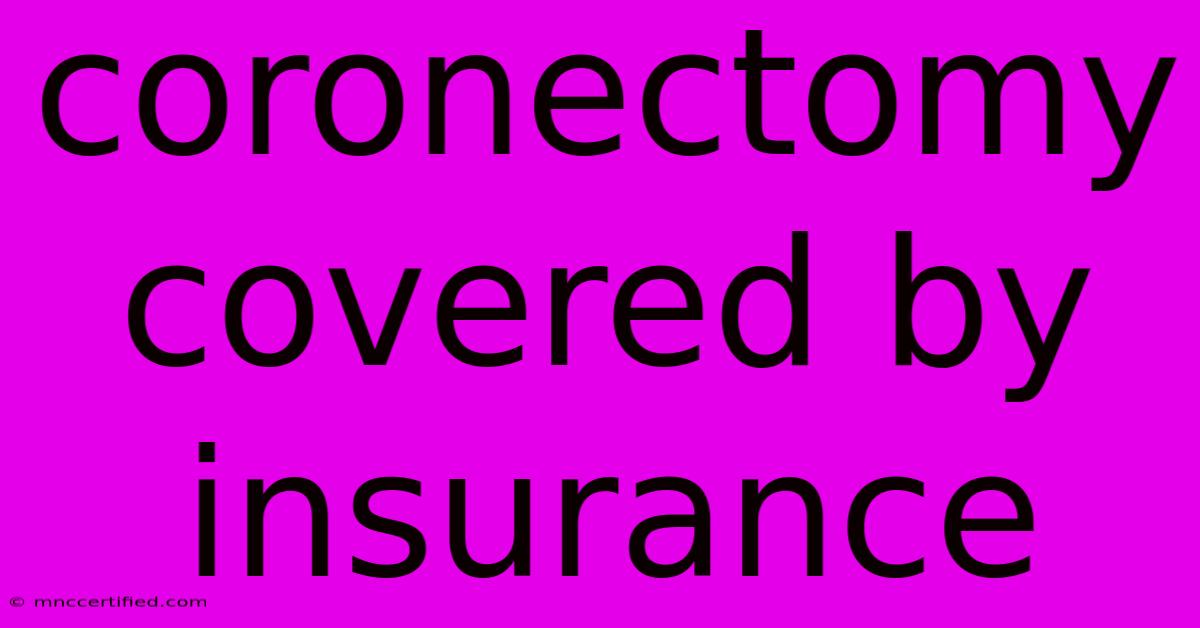Coronectomy Covered By Insurance

Table of Contents
Coronectomy: Insurance Coverage and What You Need to Know
Losing a tooth is never fun, but sometimes, saving the remaining tooth structure is possible even when the tooth itself is severely damaged. One such procedure is a coronectomy, a complex dental procedure that can be a lifesaver – or a significant financial burden – depending on your insurance coverage. This comprehensive guide will clarify what a coronectomy is, when it's used, and, crucially, how insurance companies typically handle coverage.
What is a Coronectomy?
A coronectomy is a surgical procedure where the crown of a severely damaged tooth is removed, while the roots remain intact. This is different from a traditional extraction, where the entire tooth is removed. It's typically performed when a significant portion of the tooth is compromised due to:
- Severe decay: Extensive cavities that extend beyond the reach of traditional fillings.
- Traumatic injury: A fractured or broken tooth that's beyond repair with restorative dentistry.
- Periodontal disease: Severe gum disease that has damaged the supporting structures of the tooth.
- Periapical lesions: Infections at the root tip of the tooth.
Why choose a coronectomy over extraction? This procedure offers several advantages:
- Preservation of bone and gum tissue: Keeping the roots in place helps maintain the jawbone structure and prevents bone loss.
- Improved aesthetics: A dental implant can later be placed in the space where the crown once was, providing a more natural-looking result compared to a gap.
- Simplified implant placement: The existing roots can act as anchors for a future implant, simplifying the procedure and potentially reducing costs.
- Reduced recovery time: The recovery period from a coronectomy is often shorter than from a tooth extraction.
Coronectomy and Insurance Coverage: The Complexities
The biggest question on many patients' minds is: Will my insurance cover a coronectomy? The answer, unfortunately, isn't a simple yes or no. Insurance coverage for this procedure varies greatly depending on several factors:
- Your specific insurance plan: Dental insurance plans differ significantly in their coverage levels and limitations. Some plans may cover a portion of the cost, while others may offer no coverage at all. Review your policy carefully. Look for specifics regarding surgical procedures, periodontal treatments, and implant placement (as this is often a subsequent step).
- Medical necessity: Insurance companies often require a demonstrable medical necessity for the procedure. Your dentist needs to provide comprehensive documentation explaining why a coronectomy is the most appropriate treatment option, as opposed to a simpler extraction. This requires thorough charting, x-rays, and clear justifications.
- Pre-authorization: Many insurance providers require pre-authorization before the procedure. This involves submitting your treatment plan to your insurance company for approval and determining the level of coverage. Failure to obtain pre-authorization can lead to significant out-of-pocket costs.
- Geographic location: Coverage can vary depending on your location and the insurance provider's specific contracts with dentists in your area.
What to Expect When Discussing Insurance with Your Dentist:
- Detailed explanation: Your dentist should fully explain the procedure, its benefits, and the potential costs.
- Pre-authorization assistance: Your dental office should help you navigate the pre-authorization process with your insurer.
- Payment options: Discuss financing options or payment plans if your insurance doesn't fully cover the procedure.
Maximizing Your Chances of Coverage:
To maximize your chances of insurance coverage for a coronectomy, take these steps:
- Thorough consultation: Have a comprehensive consultation with your dentist to fully discuss the procedure's necessity and potential outcomes.
- Detailed documentation: Ensure your dentist thoroughly documents your condition and the reasons for recommending a coronectomy.
- Pre-authorization: Follow your insurance company's procedures for pre-authorization diligently.
- Appeal if necessary: If your claim is denied, don't hesitate to appeal the decision. Provide additional documentation supporting the medical necessity of the procedure.
Conclusion: Planning for a Coronectomy
A coronectomy can be a highly beneficial procedure, but understanding its cost and insurance implications is crucial. By working closely with your dentist and understanding your insurance policy, you can better prepare for this complex dental treatment and navigate the financial aspects effectively. Remember to always carefully review your policy, and don't hesitate to contact your insurance provider or your dentist's office with questions. Proactive communication is key to managing the costs associated with this important procedure.

Thank you for visiting our website wich cover about Coronectomy Covered By Insurance. We hope the information provided has been useful to you. Feel free to contact us if you have any questions or need further assistance. See you next time and dont miss to bookmark.
Featured Posts
-
Underwriter State Insurance Fund
Nov 21, 2024
-
Central Florida Insurance Agency
Nov 21, 2024
-
Chad Michael Murray Merry Gentlemen And One Tree Hill
Nov 21, 2024
-
Harris Health Insurance Accepted
Nov 21, 2024
-
Smiths Children 30 Years No Apology
Nov 21, 2024